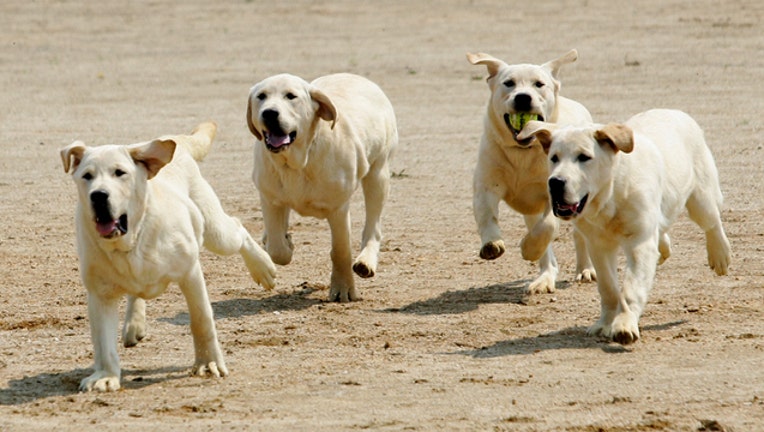Sit. Study. Fetch a bachelor's degree in dog training.

(Photo by Chung Sung-Jun/Getty Images)
COBLESKILL, N.Y. (AP) - Luna the springer spaniel is learning to sniff out a troublesome golf course fungus in return for a tennis ball while helping her handler fetch a new breed of bachelor's degree.
The four-year program in "canine training and management" officially launches this fall at the State University of New York at Cobleskill amid a surge in demand for specially trained dogs to detect security threats and assist veterans in the wake of 9/11.
While several institutions hand out training certificates and at least one small private college, Bergin University of Canine Studies in Penngrove, California, awards a bachelor's in dog handling, the program at Cobleskill is more ambitious in its scope.
"I do believe this is the first of its kind of this caliber of degree" at a major university, said Nick Hof, chairman of the Association of Professional Dog Trainers.
Professor Stephen Mackenzie, who has trained military and police dogs for 40 years and authored professional manuals on the subject, said he developed Cobleskill's Bachelor of Technology degree partly in response to a heightened demand for dogs capable of sniffing out explosives in the aftermath of Sept. 11.
"The security and working dog industry really expanded" following the attacks, Mackenzie said. Law enforcement agencies also need dogs that can ferret out drugs or to assist in search and rescue. And they need skilled people to raise and train those dogs and the handlers they'll work with.
The need for service dogs trained to assist those with post-traumatic stress disorder or reduced mobility has also expanded as veterans started returning from multiple tours of duty in Iraq and Afghanistan. There's also a growing demand for dogs trained to assist people with autism, seizure disorders, diabetes, impaired vision or hearing, and a range of other conditions, according to Assistance Dogs International, a coalition of programs that train and place service dogs.
Pet owners are also seeking trainers to teach Bailey basic manners, to stop Lucky from lunging on the leash and to generally ensure successful adoptions for shelter dogs. Hof, who does in-home dog training in Cincinnati, Ohio, said demand increases every year for professionals who charge up to $150 an hour to cultivate companionable canines.
While training is an important part of the degree, Mackenzie said students also take many science courses to learn about dog health, nutrition and genetics at the century-old agricultural college sprawled across 900 acres (3.5 square kilometers) in central New York. The degree program will build on work with canines already underway at the school.
The Bureau of Labor Statistics estimates there were about 14,300 animal trainers in the U.S. in 2016, up from 10,000 in 2013. The number of training jobs is expected to increase 22% from 2016 to 2026.
Cobleskill's canine program was a major deciding factor in choosing a college, said undergrad Jessie Show, who grew up near Scranton, Pennsylvania. She said she plans to train service dogs for people with physical handicaps.
"You see a lot of online certificates or self-taught individuals" doing dog training, Show said. "Here, we're learning from experts in the field. Dr. Mackenzie is world-renowned for temperament testing, and he instills his knowledge on us."
Show spent the spring semester working with Luna, whose owner does research on a fungus that afflicts golf greens. She taught Luna to find a fungus sample placed in one of four boxes. On a recent afternoon, Luna streaked into a training room to sniff a line of boxes, leaping to catch a ball that Show released when she chose correctly.
"We try to find where each dog is best fit for their personality and temperament," Show said. "Luna isn't spectacular at obedience, but she's very dedicated in a detection search."
The dogs, about 50 new ones each semester, are volunteered by members of the college faculty and the community. There's a diversity of breeds, including border collies, spaniels, German shepherds and poodles. Some have behavior problems the students work to resolve.
The program requires a 600-hour internship at a dog-related business, such as Guiding Eyes for the Blind, the American Kennel Club Headquarters or Search Dog Foundation.
"There are many people who don't have college degrees and are very successful in the dog industry," Mackenzie said. "But if you want a balance of science mixed with hands-on experience, and if you're going to go to college anyway, this is a really good option if you want to work with dogs."

